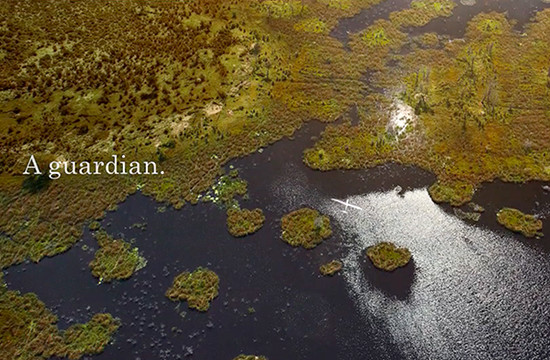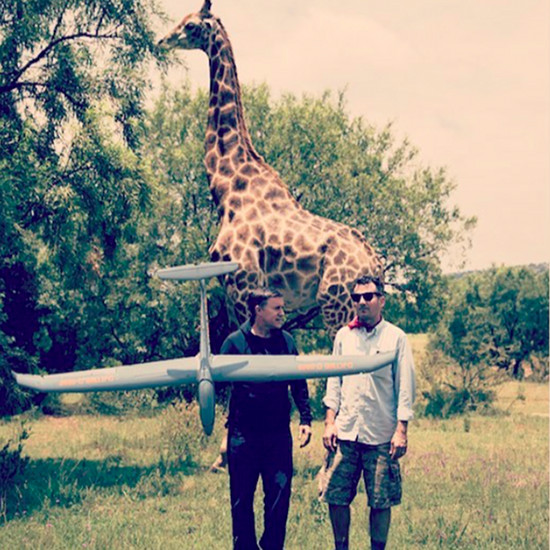
Your Shot: What’s the Collective Noun for Drones?

Wildlife poaching ranks as the world’s fourth biggest illegal trade. Worth an estimated $20bn per year, only illegal drugs, human trafficking and fake goods rank ahead of it. Make no mistake, this isn’t the odd unfortunate elephant – it’s a major, militarised concern. It’s even funding terrorism.
A new film from ad industry veteran Andy Fackrell and a crack team of talented adland volunteers offers a ray of hope. ‘A Guardian’ has been created to promote the work of OverAndAboveAfrica, an organisation that is using drone technology and artificial intelligence to keep a watchful eye on endangered species in sub-Saharan Africa.
“It’s a slaughter,” says Kerry David, founder of OverAndAboveAfrica. “Every day is a tech-war between heavily armed, well organised, skilled poachers and our courageous, but often ill-equipped rangers. Dropping our guard can mean the loss of whole herds.”
According to Andy, the project came about while he was working in Los Angeles. He happened to be sitting next to Kerry at a dinner and could immediately see the power and potential of what the charity was doing. A passionate environmentalist, who has done work for Greenpeace in the past, Andy was keen to get involved.
The AI allows the team to tackle the project at scale as it is able to distinguish whether a group of people are poachers or not. For Andy, the need to help raise awareness and funds to help was obvious. “That’s the interesting thing about the drone technology, it needs to stay up all the time and when drones are down there’s a period that they can’t monitor anything and the poachers are so tech-heavy that they know,” he says. “There’s so much corruption that you just have to keep putting more technology in the air and rangers on the ground to fight it.”
He recruited former colleagues to help bring the work to life, including director Sam Coleman, with whom he worked at 180 and producer Shannon Worley from his time at Wiedens in Portland. Andy’s also full of praise and gratitude for Sony Music Italy, who supplied a beautiful track.

Andy with director Sam Coleman
The shoot took place in South Africa – an eye-opening experience. As Andy and the team spoke with park rangers they were appalled to learn the true scale of the problem. On average, three rangers are murdered a day by poachers.
“It’s incredibly tough, especially when shooting in South Africa and hearing the stories about how endemic it is. I was in Africa seven years ago and I heard stories from the Serengeti that I couldn’t believe, that they’d go into a national park that was so revered. Now it’s every major national park,” says Andy. “It’s a very emotional project and interesting in terms of learning. It really forces you to learn what’s happening in the environment by talking to locals and hearing some of the stories.”
In fact, so fraught is the situation that the rangers who acted as poachers in the film were quite anxious about taking part. “They’re local people who probably aren’t doing that well. These guys are putting their lives on the line every time they go out there. They were quite nervous about us filming,” says Andy.
The idea behind the spot is inspired by the concept of collective nouns – florid descriptors. “The point of using the collective nouns was that they were invented in the Middle Ages - ironically, by hunters,” says Andy. “At dinner party conversations they’d try to outdo each other. So, for example, the collective noun for pheasants is a ‘bouquet of pheasants’. It’s what I like about the film. At one point we glorified animals and held them in such esteem that we built this vocabulary around them, celebrating beauty."
The problem is growing, but the drone technology is giving rangers the tools to fight back. A recent report states that 83% of wild mammals have been lost to human civilisation; yet we make up just 0.01% of the Earth’s biomass. With African elephant numbers dropping 9% per year, it’s a battle that has become a crisis, starkly evidenced by the slaughter of 90 elephants over the last two months in Botswana. But perhaps the guardians in the sky offer a ray of hope.














